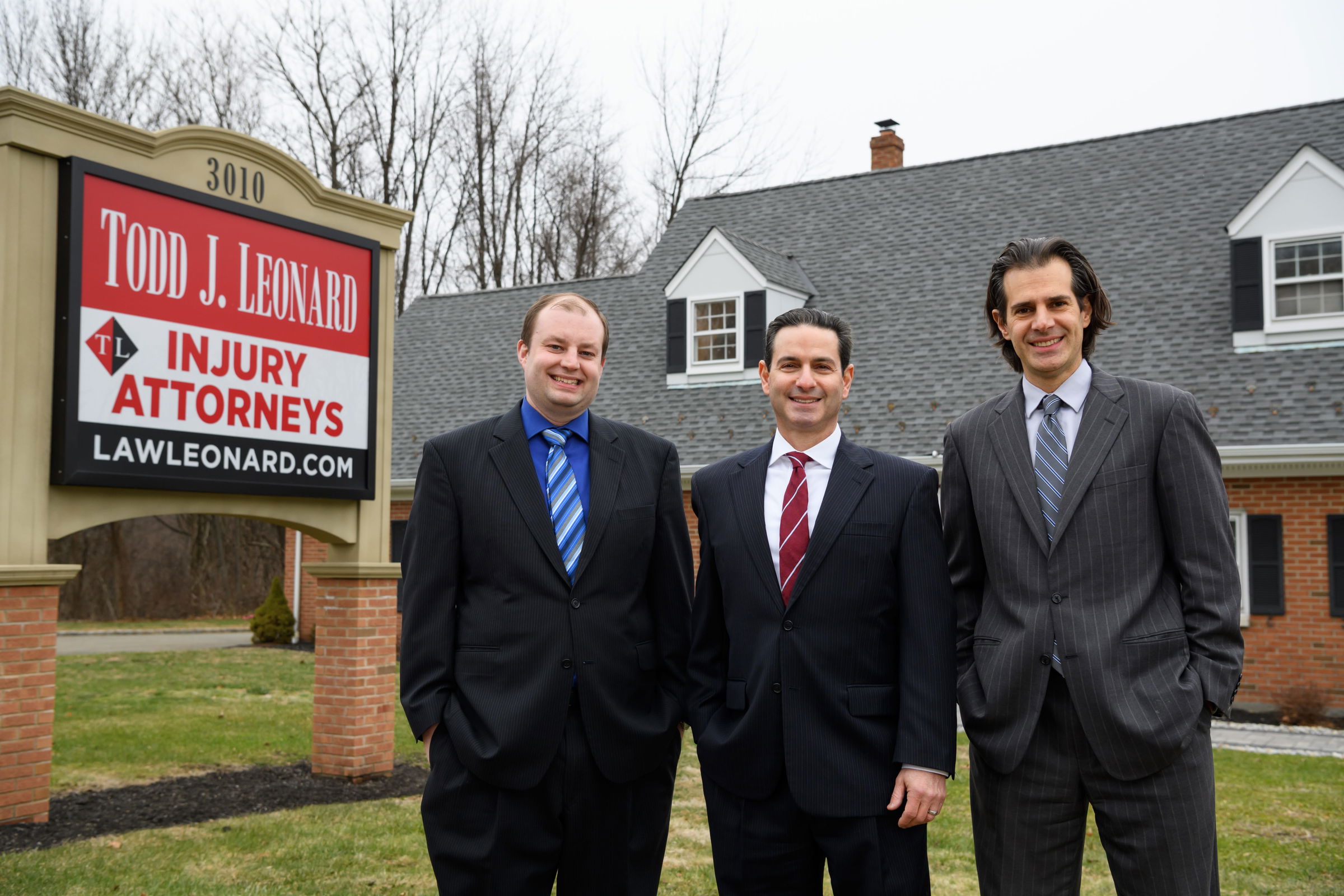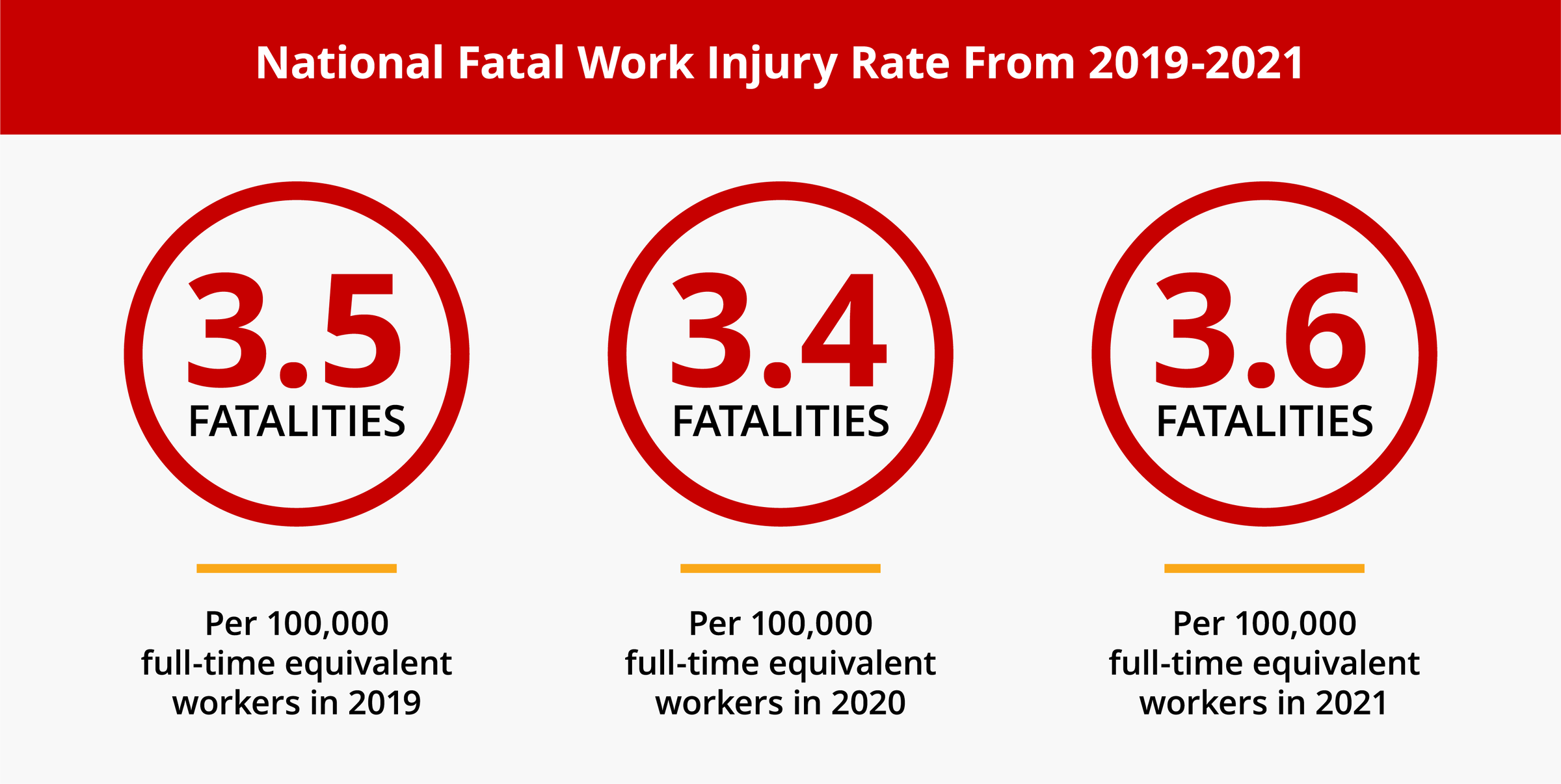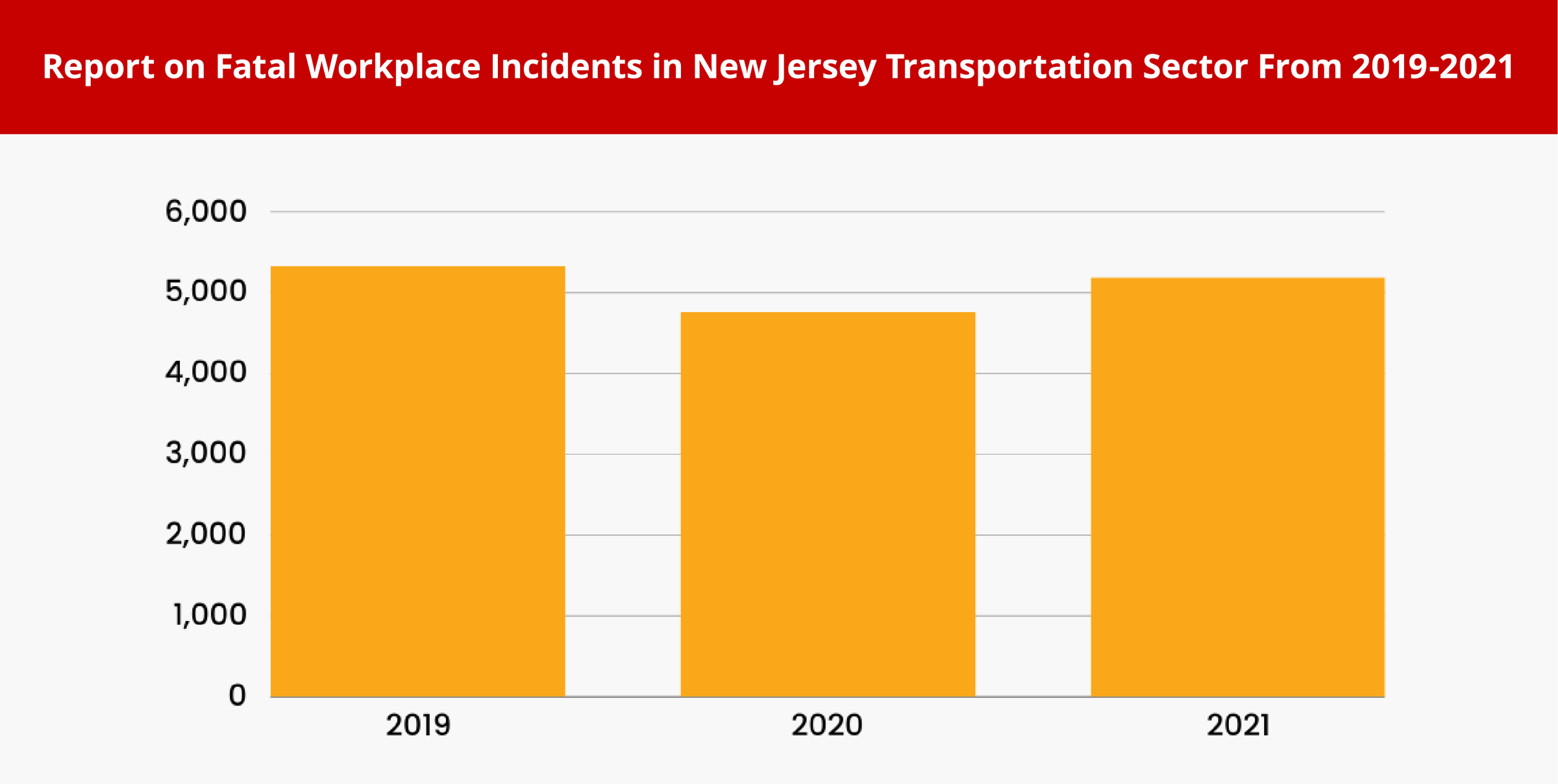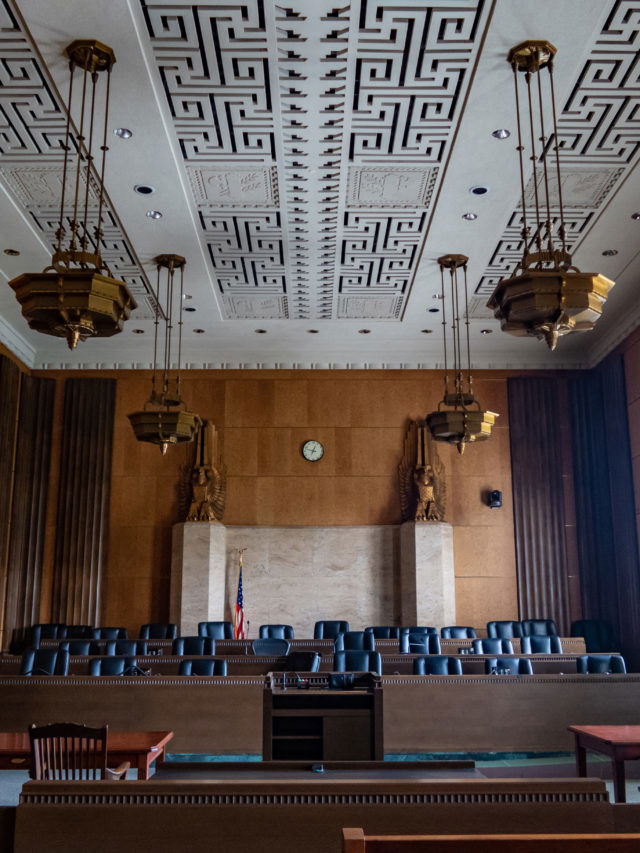Overview
In 2021, the national fatal work injury rate was 3.6 fatalities per 100,000 full-time equivalent workers.
Understanding Workers' Compensation Trends in New Jersey
Workers’ compensation rules and regulations are governed by the state. If you live and work in New Jersey, you are entitled to receive benefits under the umbrella of the New Jersey Workers’ Compensation Law. New Jersey’s law exists to protect workers injured on the job. It’s benefits also extend to families who have lost a loved one because of a workplace accident.
Workers’ compensation claims can cover injury to any part of the body if the injury was sustained because of an employee’s job. The severity of injury may be minor with a few days of missed work to serious trauma resulting in death. The following report explores workers’ compensation and injury trends in New Jersey.
We take great pride in being there for clients when they need us the most. We will do everything in our power to obtain the BEST possible result for you.


Data Collection
The data used for this report was taken from the New Jersey Department of Labor and Workforce Development, Public Entity Joint Insurance Fund, New Jersey Treasury Division of Pensions and Benefits, and State of New Jersey Department of Labor and Workforce Development Division of Workers’ Compensation, the U.S. Bureau of Labor Statistics, and Liberty Mutual Workplace Safety Index
There are numerous misconceptions about filing a workers’ compensation claim. Often, an injured worker is concerned about filing a claim that they may lose their job or face some form of retribution. It is important to know that the law protects an injured worker from such actions. At the Todd J. Leonard Law Firm, we evaluate your case and advise you on the best way to obtain benefits.
What is Workers' Compensation?
New Jersey Workers' Compensation provides benefits for workers hurt on the job.
It does not matter who was at fault in a workplace accident. An injured worker secures benefits no matter what, and in most cases cannot bring a civil action against the employer. However, there are exceptions to that rule, and a worker may file a third-party lawsuit depending on the circumstances of the accident that resulted in injuries.
Nationwide Workers’ Compensation Statistics
Disclaimer: Nationwide injury data are available for the years 2020 and 2021. These data contain some unusual fluctuations in large part due to illness claims during the COVID-19 pandemic. Occupational illness survey statistics include cases of COVID-19 where an employee was infected at work.
In 2020, U.S. employers reported 2.7 million illness and injury cases, according to data from the Survey of Occupational Injuries and Illnesses. The number of reported incidents decreased to 2.6 nonfatal illnesses and injuries in 2021, a 1.8 percent decline from 2020.
A comparison with pre-pandemic data illustrates the change in distribution of injury and illness cases. In 2020, employees reported 2.1 million nonfatal injuries, which is a 22 percent decrease from the 2.7 million injuries reported in 2019. However, workplace illness cases nearly quadrupled from 2019 to 2020. In 2021, that trend reversed itself, and the number of illness cases fell 33 percent. Respiratory illness incidents decreased by 37 percent from 428,700 in 2020 to 269,600 in 2021.
However, this is still significantly higher than the rate of 127,200 illness and 10,800 respiratory illness cases reported in 2019.
New Jersey Workers’ Compensation Statistics
Private New Jersey employers reported 75,800 nonfatal injuries and illnesses in 2020, which translates to an incident rate of 2.9 cases per 100 full-time equivalent workers. Two sectors, transportation trade, education and health, and utilities reported 70 percent of the illnesses and injuries.
Of the 75,800 reported incidents, 54,200 resulted in days away from work, a job transfer or a restriction. These more severe cases are referred to as DART cases.
Public sector employers reported 16,600 injury and illness cases in 2020, which translates to an incidence rate of 4.1 cases per 100 full-time workers. This is slightly higher than the nationwide incidence rate of 3.9.
New Jersey is one of 20 states in which the statewide incident rate is statistically higher than the national rate of 2.7.
Non-fatal injuries and illnesses reported by Private New Jersey Employers in 2020.
Non-fatal injuries and illnesses reported by Public Sector Employees in 2020.
Transportation Trade and Education & Health sectors reported 70% of non-fatal injuries and illnesses in 2020.
What to Do in the Event of a Workplace Accident
Early reporting is key to a successful workers’ compensation claim. If you are injured, tell a manager, supervisor, or both immediately. If you cannot find a manager, speak to the assistant manager or human resources.
In New Jersey, you have 90 days from the time of the incident to notify your employer.
When reporting about the incident, list the job you were performing, the injury and your full name. Also, add as much detail as you can about when, where and how the injury happened. Also, include the names of anyone else involved in the accident. Although notice of your accident does not have to be in writing, it is best if there is a paper trail detailing every step of the process, from injury to receiving benefits.
See an employer approved doctor if that is required by your employer. If required, you must see an approved doctor, or your workers’ compensation claim can be denied.
Keep accurate records of all medical care you receive. That includes all expenses, doctor's appointments, and other associated costs, such as going for physical therapy sessions or surgery.
What Happens After a Workers' Compensation Claim is Filed?
After an incident is reported to an employer, the employer's insurance carrier typically files a First Report with the state.
During this process, the claim is assessed to see if it is compensable according to New Jersey workers' compensation law. During the assessment period, the injured worker, the employer and the health care provider are contacted for details.
Once accepted the injured worker is sent to an authorized physician for care. If the worker is off work for longer than 7 days, they receive temporary disability benefits during the rehabilitation period.
Within 182 days after returning to work, or attaining maximum medical improvement (MMI), the insurance carrier is required to submit the Subsequent Report of Injury. The injured worker receives a copy to review.
If there is a dispute over the claim, a worker may file an Application for an Informal Hearing, or a formal Claim Petition with Workers' Compensation. Disputes may arise over whether an injury was work-related, whether an injured worker has reached MMI, or the nature of the injury, among other things.
Step 1: Report Incident to Employer
After being reported to, the employer's insurance carrier files a First Report with the state.
Step 2: Claim Assessment
During the assessment period, the injured worker, the employer and the health care provider are contacted for details.
Step 3: Claim Accepted
Once accepted, the injured worker is sent to an authorized physician. Temporary disability benefits are provided if the injured person is unable to work for more than 7 days.
Step 4: Subsequent Report of Injury
Within 182 days after returning to work, or attaining maximum medical improvement (MMI), the insurance carrier must submit the Subsequent Report of Injury.
Dispute Resolution
Workers can file an Application for an Informal Hearing or a formal Claim Petition with Workers' Compensation if there is a dispute over a claim. Disputes may arise over the work-relatedness of an injury, MMI, or the nature of the injury.
What if I am Discriminated Against for Filing a Claim?
Although discrimination against a worker for filing a workers' compensation claim is against the law in New Jersey, it is helpful to know that the usual remedy, which is reinstatement. In this case, the worker must be able, willing, and ready to carry out the position's duties. There are two routes to follow in such an instance: civil or administrative.
If the worker chooses the civil course, the complaint against the employer is filed in the Civil Part of the Superior Court. If they choose the administrative process, the Office of Special Compensation Funds will investigate. However, if an injured worker feels they have a claim that violates the Americans with Disabilities Act (ADA), they would file that claim with the Equal Employment Opportunity Commission.
Filing a workers' compensation claim in New Jersey can be complicated, and at the Todd J. Leonard Law Firm, we understand that. We are here to help you with your claim, explain your legal rights, marshal the documents you need, outline what they mean and what information you need to submit, and help you seek the compensation you deserve.
Workplace Fatalities
Nationwide, a U.S. worker died every 101 minutes in 2021 and 111 minutes in 2020. Workplace fatality trends followed injury trends pre-and post-pandemic. Fatal workplace incidents dropped 10.7 percent from 2019 to 2020, from 5,333 cases to 4,764 cases.
However, fatal work injuries climbed again in 2021, with 5,190 fatal events recorded in the U.S, reaching near pre-pandemic levels. This represents an 8.9 percent increase from 2020.
In 2021, the national fatal work injury rate was 3.6 fatalities per 100,000 full-time equivalent workers. This is and an increase from 2020’s rate of 3.4. And 2021’s rate is also up from the 2019 pre-pandemic rate of 3.5. fatalities per 100,000 full-time equivalent workers.
According to U.S. Bureau of Labor Statistics, New Jersey saw 82 workplace fatalities in 2020. This is up from a statewide low of 69 in 2017.
Men are significantly more likely to suffer a fatal workplace injury than women. Nationwide, approximately 92 percent workplace deaths are among men. In New Jersey, 93 percent of reported 2020 workplace deaths were among men.

Fatal Incidents by Industry
When people think of a work-based injury, they often think of an incident that happens at a specific physical place of work. However, the transportation sector sees the most fatal accidents, with 1,778 reported deaths in 2020 and 1,982 reported fatalities in 2021.
In New Jersey, In New Jersey, transportation incidents caused 24 fatal work injuries in 2020, which is 29 percent of all fatal incidents. Exposure to harmful substances caused 19 fatalities, and slips, trips, and falls accounted for 18. Overall, 74 percent of all fatal New Jersey workplace accidents happened in these three categories.
The highest number of private sector fatalities occurred in the private construction industry. In fact, the construction and extraction occupational group saw the most fatal accidents, with 22, which is unchanged from 2019.

Frequently Asked Questions
Workers’ Compensation Statute of Limitations in New Jersey
An injured New Jersey worker must file a workers' comp claim within New Jersey's time limit for filing a claim, which is two years from the date of injury or the date of the last payment of compensation, whichever is later. Although there is a statute of limitations, do not wait to file a claim. File it as quickly as possible, or you run the risk of being denied as the claim ages.
If the injury is a persistent occupational illness (e.g., repetitive use), a claim must be filed within two years of the date the employee became aware of the condition, and became aware and knew, or should have known, their condition or injury is related to their employment.
Interesting Workers' Compensation Court Cases
In that case, the court affirmed the workers' compensation order and an order by the Appellate Division to find that the respondent was to pay the cost of medical marijuana. The court further found medical marijuana was a reasonable and necessary treatment, and the employer was not aiding and abetting the petitioner's marijuana possession by paying for those costs.
In another workers' compensation case, the Appellate Division agreed to a dismissal of the of the claim based on the Premises Rule. The case, Pilone v. Cnty. of Middlesex, Docket No. A-1676-19, (Appellate Division, Decided Mar. 15, 2021) found that the rule limits an employer's liability to a location they control by exclusive use, ownership, and/or maintenance. The court noted the company did not have control over the sidewalk where the petitioner fell, and that the injury was not compensable as it did not happen out of and in the course of the petitioner's employment.
At the Todd J. Leonard Law Firm, we understand the ins and outs of difficult workers’ compensation claims. That's what we are here for – to assist and guide an injured workers through the maze of filing and succeeding in securing benefits for their injuries.

New Jersey Workers' Compensation Lump-Sum or Periodic Payments
Workers' compensation may be paid out in the form of a lump sum or as periodic payments.
Only periodic payments replacing lost wages are pensionable. Lump-sum payments for medical costs and/or damages are not pensionable.
Other issues you may run into are workers' compensation awards “with pay.” This means the worker is on the regular payroll and the insurance is paid to the company location. In this case the worker is responsible for all deductions. The Todd J. Leonard Law Firm can explain how this works if this is the situation you are in.
If the award is a periodic workers' compensation award with pay and it only represents a percentage of the worker's usual salary, the worker still contributes the normal amount of pension deductions.
In some cases, an employer augments a workers' compensation award if it is less than the full base salary. If that happens, the worker is an employee with pay and is receiving full pay. Therefore, regular deductions and full contributions are withheld from the worker's salary.
There are also workers' compensation awards without pay which means the injured worker is receiving a benefit check directly from the insurance company. In this situation, the employer is responsible for paying the worker's normal pension contributions and mandatory back deductions.
And, if a periodic Workers' Compensation award "without pay" is a percentage of the worker's regular salary, the employer pays the full monthly pension contributions for the member.
New Jersey workers' compensation is a welcome system for injured workers and has helped many recover and return to work. In most instances, a claim is relatively straightforward. In other cases, not so much. At the Todd J. Leonard Law Firm, we understand how difficult it can be to navigate the system and that's why we are here to help you.
Nationwide Statistics of Interest
The Liberty Mutual Workplace Safety Index reported in 2022 that there are ten top causes of accidents at work in various industries.
Overexertion
Nationwide, these injuries cost workers' compensation $12.63 billion in 2019.
Same-level falls
These injuries cost $10.26 billion nationally in workers' compensation.
Struck by equipment or object
Flying objects and pieces of machinery injuring workers resulted in $5.66 billion in workers' compensation being paid out in 2019.
Falling from a height
These accidents resulted in $5.07 billion in workers' compensation.
Bodily reaction or other exertions
Injuries like this resulted in $4.01 billion in workers' comp payouts.
Vehicle accidents
There was $3.59 billion paid out in workers' compensation in 2019.
Slip, trip, but no fall
Accidents like this in 2019 resulted in $2.52 billion in workers' compensation payouts.
Caught by accidents
There was $21.19 billion paid out nationwide in workers' compensation benefits.
Struck against accidents
These involve a worker walking into an object or a piece of equipment. There was $1.87 billion in workers' compensation paid nationally in 2019.
Off-road accidents in vehicles
Nationally, there was $1.39 billion paid out in workers' compensation in 2019.
Contact the Todd J. Leonard Law Firm for Immediate Assistance
If you have been in an accident at work, call us to discuss your case. At the Todd J. Leonard Law Firm, our New Jersey workers' compensation attorneys have over 35 years of experience aggressively representing seriously injured clients in all types of workers' compensation claims.
To learn more about how we can help you pursue a workers' compensation claim, give us a call today at (973) 920-7900 to request a free and confidential consultation. There is never a fee unless we win.